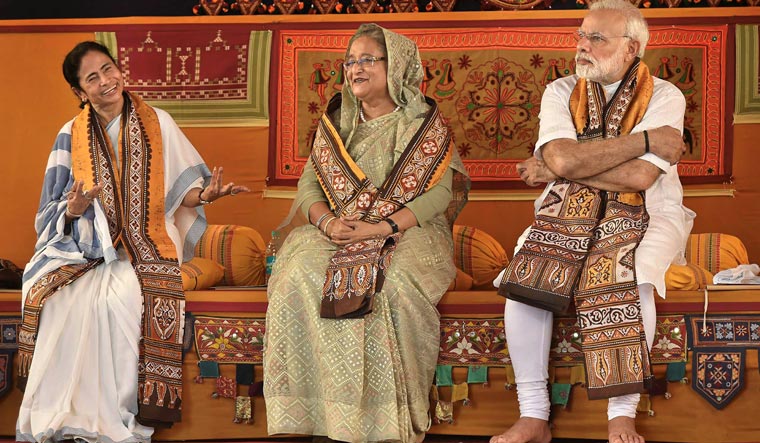In a prime example of how a domestic political situation can throw obstacles in way of international relationships, especially when it comes to the neighbouring allies like Bangladesh, India’s Foreign Secretary Harsh Vardhan Shringla made a sudden two-day visit to Dhaka. Shringla’s sudden visit to Dhaka comes in the backdrop of Bangladesh’s recent pivot towards China.
India and Bangladesh traditionally maintain close ties, but the inability to finalise a River Teesta water sharing treaty has turned out to be a major obstacle between the bilateral relations of the two countries. However, the issues aren’t related to New Delhi, but the reluctance of West Bengal Chief Minister Mamata Banerjee.
China has successfully used the Teesta logjam to make inroads into Bangladeshi river management projects aimed at maintaining sufficient water levels during dry seasons. As per the Bangladeshi media reports, China is pumping in one billion US Dollars to maintain sufficient water levels during droughts after the Teesta water-sharing treaty dialogue between New Delhi and Dhaka failed.
Jyoti Prosad Ghosh, an Additional Chief Engineer at the Water Development Board, told BenarNews, “A massive project funded by China has been adopted for the management of the Teesta River and China has agreed to fund it. Hopefully, we can start the project by December.”
As for the Bangladesh PM, inability to sign a Teesta water-sharing treaty with India remains the lone point of ‘dissatisfaction’ in bilateral ties between New Delhi and Dhaka. India also realises the importance of finalising a treaty for water sharing and in fact, the sharing of the river water was also decided on a certain level. The Government of India itself was on board to go ahead with the agreement.
But the TMC supremo, it seems, doesn’t want the treaty to get through and she has not even been subtle in her resistance to the Teesta water-sharing pact. Even last year, Mamata Banerjee expressed her reluctance towards the Teesta water treaty in the West Bengal legislative assembly.
Needless to say, Mamata Banerjee and Sheikh Hasina share a hot and cold relationship, despite the historic ties between the state of West Bengal and Bangladesh. Back in 2011, Mamata Banerjee had even refused to accompany former PM Manmohan Singh on his Bangladesh visit. Despite requests coming directly from Hasina, the West Bengal CM had refused to relent.
Hasina herself understands how Mamata Banerjee stands in the way of the Teesta River water-sharing agreement. In 2018, she had expressed the expectation of the Teesta logjam being resolved. “But Didi (Mamata Banerjee, Chief Minister of West Bengal) didn’t give water,” Hasina said.
Bangladesh is a lower riparian country as the Teesta originates from Sikkim, passes through West Bengal and ultimately reaches Bangladesh. The river drains an area of 2,800 square kilometres in Bangladesh and remains the lifeline of hundreds of thousands of people in the country. This is why it is such an emotive issue in Dhaka.
For the past eight years, the Teesta River water-sharing treaty has been pending. Neither the former PM Manmohan Singh nor the present PM Narendra Modi has been able to go ahead with it due to reluctance in Kolkata.
As expected, China was not going to miss out even on slightest of bitterness between India and Bangladesh. And therefore the Dragon chose Teesta to make inroads in Dhaka. India, of course, doesn’t want China to spoil New Delhi’s ties with a frontline neighbouring ally like Bangladesh, which is why Shringla was rushed to Dhaka.
Shringla himself exercises a lot of diplomatic influence in Bangladesh, owing to a three-year stint in the country as India’s High Commissioner from 2016-2019. Shringla also maintains a good equation with Sheikh Hasina which is now clearly being put to use.
As per News18, Shringla’s meeting with Hasina has been described as “excellent”. By rushing a top diplomat to Dhaka, Prime Minister Modi has signalled to Sheikh Hasina that New Delhi intends to maintain very close ties with Dhaka, notwithstanding the elusive Teesta water-sharing treaty.
The Subcontinent remains a playground for Sino-India rivalry and competition. India needs to tread cautiously to preserve its friendly neighbourhood from an invasive China. But it seems that PM Modi will have to take care of not only bilateral and multilateral issues but also domestic political issues that tend to embitter New Delhi’s relations with its allies next door.
